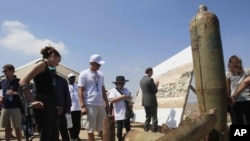LONDON - During the past three years, financial institutions around the world have invested more than $40 billion in producers of banned cluster munitions, according to a report published Thursday. The investors include Citigroup, JP Morgan Chase, Goldman Sachs, Deutsche Bank and China Merchants Bank.
According to the research paper, 137 private and public institutions have been investing in manufacturing companies that produce cluster munitions.
Report co-author Roos Boer says making those investments is counterproductive.
"If you want to rid the world of cluster munitions, it makes no sense to continue to invest in those weapons," said Boer, a policy analyst for the Netherlands-based campaign group IKV Pax Christi, which published the report along with the Belgium-based group FairFin.
The global Convention on Cluster Munitions bans the use, production, stockpiling and transfer of cluster bombs. More than 100 countries have signed on, but a number of manufacturers are known to still make the bombs, including a number of U.S.-based companies.
"For countries that did not sign the treaty, it is of course completely legal to produce them," said Boer. "For example, for U.S. companies, it is not prohibited at all to produce cluster munitions because the United States has not signed the treaty."
Laura Cheeseman, the director of the Cluster Munition Coalition in London, says the campaign to end investment and production of cluster munitions is vital because they kill indiscriminately.
"The cluster bombs and the explosive bomblets in particular do not always explode on impact so they lie active and deadly on the ground, acting almost like de-facto landmines," said Cheeseman. "And they can be lying on rooftops, hanging in the trees, months, even years after a conflict has ended. So even when the fighting ends, these weapons continue to inflict suffering on the civilian population."
But she says the tide appears to be turning. According to Thursday’s report, 56 financial institutions have disinvested from cluster munitions producers. And, says Cheeseman, countries are filling the loophole that has permitted investments.
"There are a number of countries, five countries, that have passed specific national legislation banning financing of cluster munitions production," she said. "But really we would like to see more countries. And there are around 20 countries that say they share this view that investment should be banned and what we would like to see is them moving forward and taking that extra step to legislate against it."
The countries that have brought in new legislation are Belgium, Ireland, Italy, Luxembourg and New Zealand.
According to the research paper, 137 private and public institutions have been investing in manufacturing companies that produce cluster munitions.
Report co-author Roos Boer says making those investments is counterproductive.
"If you want to rid the world of cluster munitions, it makes no sense to continue to invest in those weapons," said Boer, a policy analyst for the Netherlands-based campaign group IKV Pax Christi, which published the report along with the Belgium-based group FairFin.
The global Convention on Cluster Munitions bans the use, production, stockpiling and transfer of cluster bombs. More than 100 countries have signed on, but a number of manufacturers are known to still make the bombs, including a number of U.S.-based companies.
"For countries that did not sign the treaty, it is of course completely legal to produce them," said Boer. "For example, for U.S. companies, it is not prohibited at all to produce cluster munitions because the United States has not signed the treaty."
Laura Cheeseman, the director of the Cluster Munition Coalition in London, says the campaign to end investment and production of cluster munitions is vital because they kill indiscriminately.
"The cluster bombs and the explosive bomblets in particular do not always explode on impact so they lie active and deadly on the ground, acting almost like de-facto landmines," said Cheeseman. "And they can be lying on rooftops, hanging in the trees, months, even years after a conflict has ended. So even when the fighting ends, these weapons continue to inflict suffering on the civilian population."
But she says the tide appears to be turning. According to Thursday’s report, 56 financial institutions have disinvested from cluster munitions producers. And, says Cheeseman, countries are filling the loophole that has permitted investments.
"There are a number of countries, five countries, that have passed specific national legislation banning financing of cluster munitions production," she said. "But really we would like to see more countries. And there are around 20 countries that say they share this view that investment should be banned and what we would like to see is them moving forward and taking that extra step to legislate against it."
The countries that have brought in new legislation are Belgium, Ireland, Italy, Luxembourg and New Zealand.




